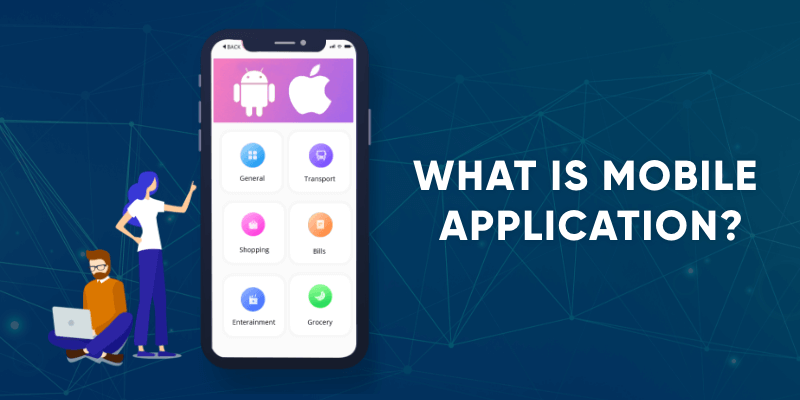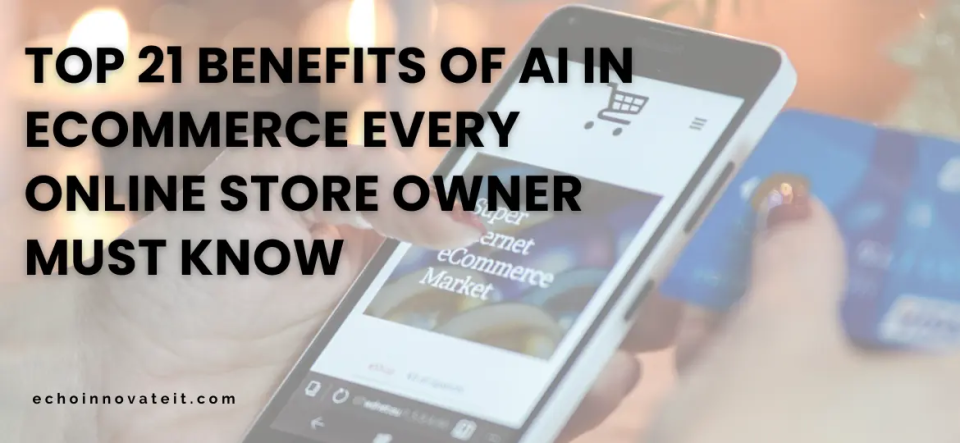The mobile app market is a rapidly growing industry that attracts businesses from many industries. The popularity of mobile applications has risen steadily. According to market research firm Gartner, 102 billion apps were downloaded in 2013, with 91% being free, generating $ 26 billion, up 44.4 percent from $ 18 billion in 2012. According to the Analysis Report, the app market generates more than € 10 billion in revenue each year in the European Union, and the rise of the app industry has created more than 529,000 employment in 28 EU nations. Because of the growing popularity of smartphones and tablets, mobile application development is becoming more popular among entrepreneurs worldwide.
Mobile applications are a departure from the coordinated programming approaches used on PCs for the most part. If everything else is equal, each application offers minimal and isolated utility, such as a game, a numerical calculator, or mobile web browsing, which provides limited and isolated utility. Even though early mobile phones’ limited equipment resources prevented applications from performing numerous jobs, their explicitness is now vital for their desirable quality because it allows buyers to pick and choose what their devices can do.
Searching for a top Android App Development Company in USA? Get in touch!
What Is A Mobile Application?
A mobile application, sometimes an app, is software that runs on a mobile device like a smartphone or tablet computer. Mobile applications frequently offer services similar to those found on desktop computers. Apps are little pieces of software that run independently and have limited functionality. Apple Inc., with its App Store, which offers thousands of apps for the iPhone, iPad, and iPod Touch, popularized the usage of app software.
A mobile app (or mobile application) is a software application developed specifically for use on small, wireless computing devices, such as smartphones and tablets, rather than desktop or laptop computers. In the realm of mobile application development, apps are often categorized as web-based or native, which are created specifically for a given platform. A third category, hybrid apps, combines elements of both native and web apps.
In today’s digital age, mobile applications are an essential part of most people’s daily lives. From social networking and entertainment to productivity and business, mobile apps play a vital role in how we interact with technology. This increasing reliance on mobile technology has led to a surge in demand for mobile application development companies that specialize in creating tailored solutions for various industries. The rise of CVS mobile applications is also notable, as they enhance customer engagement and streamline services. As more businesses recognize the value of a strong mobile presence, mobile phone application development continues to grow, shaping the future of digital interaction.
Categories Of Mobile Applications
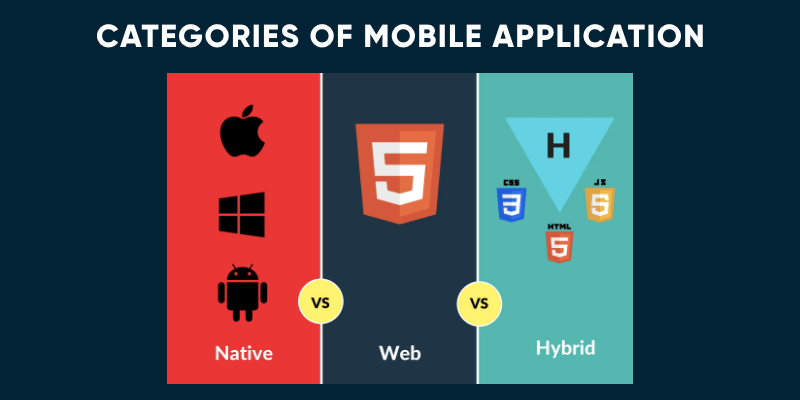
Native Application
A native mobile application is a type of app built and developed using a particular coding language for a specific device platform, such as Android or IOS. The device platform must grant access to the coding language developers choose to construct a native application. Offline mobile games, dictionary apps, and similar features are standard in this area.
The fundamental benefit of native applications is that they provide a superior and beautiful user experience. Designers who create them, on the whole, use native UI devices. Access to many APIs also speeds up development and expands the application’s functionality. Native applications must be acquired from app stores and installed directly on mobile devices. That is why they must first go through a rigorous distribution process.
Generally, the game’s images, audio, and stages are all downloaded so that the player can play it without needing to connect to the internet (Some games necessitate an internet connection to log in, buy or sell items within the game, or since they are online games). Facebook is another well-known example of a native mobile app that everyone is familiar with.
How Are Mobile Apps Built?
Mobile applications are built using a variety of programming languages and frameworks tailored to specific mobile application development platforms. These apps can be downloaded and installed from popular app stores such as the Apple App Store or Google Play. When considering how to make a mobile application, developers focus on providing a wide range of functions and services while considering the demands, constraints, and capabilities of the devices they’re built for. For example, a gaming app might leverage the iPhone’s accelerometer for enhanced gameplay.
Mobile apps serve various purposes, including games, social media platforms, email clients, and banking applications. They can also be utilized to access information like news and weather updates and perform tasks such as online shopping and booking travel. The mobile application development cost can vary significantly based on the complexity of the app and the mobile application development services chosen. Additionally, with the rise of multi-platform mobile application development, businesses can reach a broader audience by creating apps compatible with multiple operating systems. Effective mobile application management is also crucial for maintaining app performance and user satisfaction. A notable example of a successful mobile app is the Airbnb application mobile, which revolutionizes the way people book accommodations and manage their travel plans.
Web Application
Web applications are software apps that run on mobile devices in the same way as native mobile applications do. There are, nevertheless, significant distinctions between native and online programs. For beginners, web applications run in browsers and are often developed in CSS, HTML5, or JavaScript. Such apps take users to a URL and then allow them to install the program. As a result, online apps compel users to save a particular page for future reference. That is why they demand the least amount of memory.
Web applications are similar to native applications in terms of structure but are accessed through a website browser on your mobile device. In terms of downloading and installing code into your device, they are not stand-alone applications. They’re mobile-friendly websites that adapt their user interface to the client’s device. When you choose to “install” an online application, it usually just bookmarks the site’s URL on your device.
Hybrid Application
The advantages of mobile web and native apps are combined in a hybrid app. It’s made with HTML, CSS, and Javascript and runs on a mobile WebView. On the other hand, the Hybrid App can still use the device’s features like capture, GPS, vibration, and so on.
These are online applications that look and feel like native apps. They may have a home screen application symbol, responsive design, rapid speed, and even the ability to work without an internet connection. Still, they are online applications designed to look native.
Cordova, Phonegap, Ionic, and other cross-platform frameworks will be used to create hybrid apps. We’ll use the API provided by this framework, which is in Javascript, to call the mobile’s functions. These frameworks will automatically transform this program into installation files for Android and iOS, so you only have to write once. This development strategy is preferred by some applications that do not require a lot of computing power and need to reap the benefits of the device’s capabilities.
Types Of Mobile Applications
Gaming Mobile App
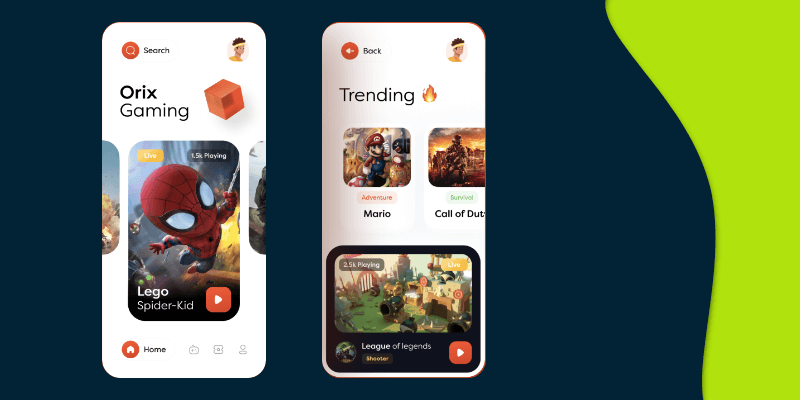
This is the most well-known classification for mobile applications. You’d be surprised at the number of customers with games downloaded on their phones. Because it is a highly lucrative market, companies devote significant effort and resources to developing games and mobile versions of well-known stationary games. According to a new Sensor Tower analysis, mobile game downloads have surpassed 12 billion, over seven times the second most popular category on Google Play.
Candy Crush Saga and Angry Birds are two of the world’s most popular mobile game apps.
Educational App
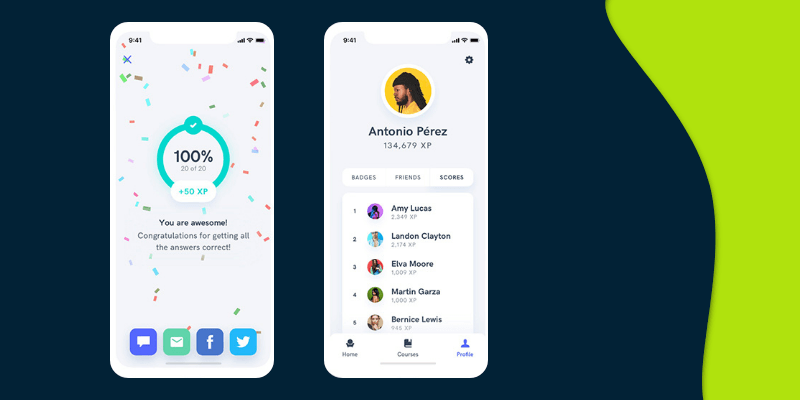
This category includes portable programs that assist users in learning new skills and information. Language learning apps like Duolingo, for example, have exploded in popularity because they provide consumers with the adaptability they want in learning. Educational game applications are a fantastic tool for students. Many education apps become well-known among educators, who use them to improve their teaching methods or to increase their knowledge. Another great example is the Google Classroom app.
App for Productivity or Business
People are more inclined to use their smartphones and tablets to complete various complex jobs quickly. Therefore, these applications have a significant market share. For example, applications can let them book tickets, exchange messages, and keep track of their work progress. Business applications enable clients to do a wide range of tasks, from ordering new office printer cartridges to hiring a new office director, increasing profitability and lowering costs. QuickBooks and Skype are great examples of small business apps.
E-Commerce App
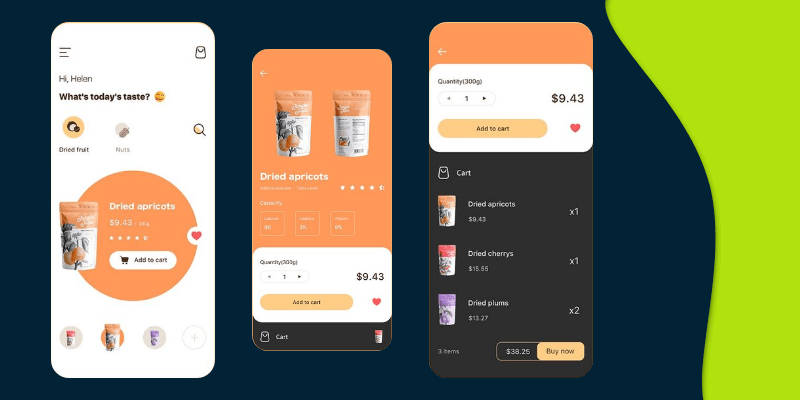
The most well-known shopping apps, such as Amazon or eBay, provide mobile users with the experience of their working assistant forms. For an ideal purchasing experience, ecommerce apps provide clients convenient access to products and various consistent payment options.
Lifestyle App

Shopping, style, virtual fitting rooms, exercise, dating, diet and Salon applications are all included in this broad category. These apps generally revolve around various aspects of a person’s lifestyle. Apps like Presently and Self Mentor are beautiful examples of lifestyle apps.
Travel App
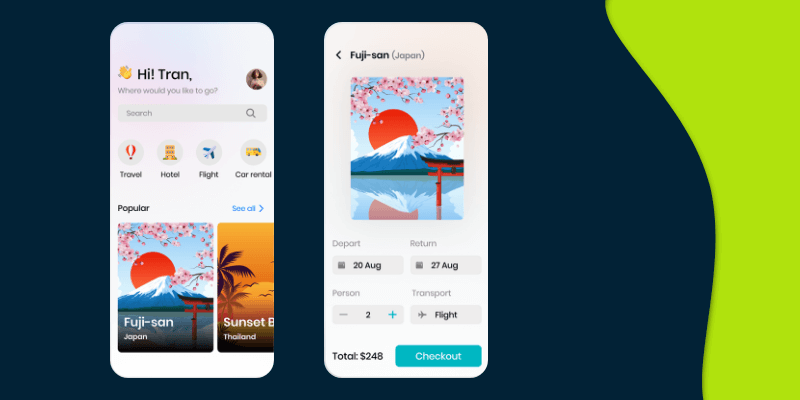
The main idea behind custom travel applications is to aid consumers in travelling without difficulty. Users of travel apps could turn their phone or tablet into a movement journal to acquire beneficial directions, guidance, and preferences. Most sightseers are savvy travellers who know how to use applications to their benefit. LoungeBuddy and Airbnb are great examples of travel applications.
Entertainment App

Clients can use these apps to share video content, browse for events, speak, or watch online information. Facebook and Instagram are excellent examples of online media applications. Furthermore, streaming services such as Netflix and Amazon Prime Video have become enormously popular with customers worldwide. These apps provide mobile users with various enjoyable methods in different forms and versions and constant change to satisfy user demand.
Utility App
We don’t even realize we use them since they’re so obvious. Utility applications, in fact, often have the shortest user session times — people use them to finish tasks and then move on. Standardized identity scanners, trackers, and medical services applications are the most common utility applications. Gasbuddy and Google Translate are excellent examples of Utility applications.
Food Delivery and Grocery Mobile App
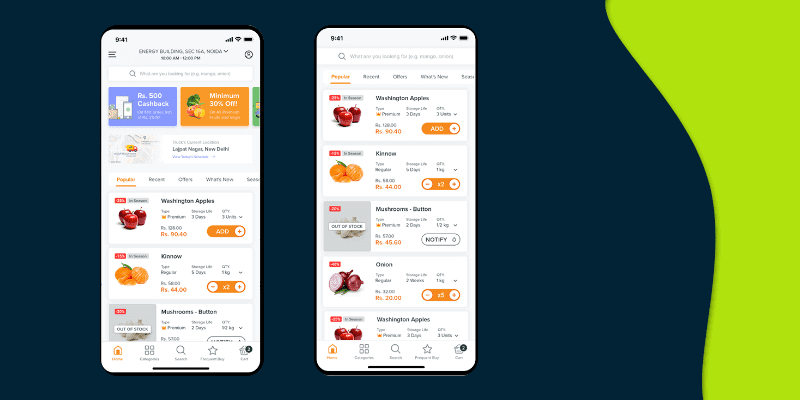
Food delivery apps have gained traction in the last few years. Rather than resisting change, grocery stores have recognized the value of digitization and are beginning to realize the opportunities that on-demand grocery mobile applications may provide. Many grocery stores have gone on-demand, and many more aggregators have emerged to provide a platform for those lacking the resources to go online. Instacart and Postmates are great examples of grocery mobile apps.
Essential Steps Involved In Developing A Mobile App
Have you ever dreamt of developing a mobile app for your business but don’t know how? Creating a mobile app is a systematic process with numerous essential stages. Here’s the breakdown:
Choose the category and type of app you want for your business.
The application’s name determines how your app’s users perceive you and your business. If you already have a successful firm, it’s a good idea to keep the same or similar name so that your current customers can easily find you and trust your product.
Select the Design Look and Color Scheme
Once you’ve decided on a name for your app and a business classification, you’re one step closer to answering your question about how to build an app. Now is the moment to decide which shade scheme will work best for your application.
Choose an appropriate Test Device
It’s important to consider how to create an app that looks fantastic on your chosen device and what it would seem like for your app’s users. This is undoubtedly the most exciting part of the cycle since you will see the results of your efforts.
Install the app on your device
This is undoubtedly the most exciting part of the interaction because you can witness the results of your efforts. You may introduce your preferred app on a device with the help of the QR Code or the connection.
Add the highlights you need
It is essential for an ideal application to add the correct highlights and highlights that perform effectively for your application and assist your clients in the best possible way. In most cases, this is determined by the application’s design.
Do the Testing and Adjustment, if any
You can assess the quality of your app, any flaws, and what you can do to enhance it by testing it.
Publish your Mobile App
Once you’ve published your Android app on the Google Play Store and iOS app on the Apple App Store, your app users can download it from there.
Promote your mobile app
Remember how people may already use a specific solution when developing an application to address a current issue. You’d have to find a way to persuade them to implement that change.
Having a top mobile app development company is crucial to developing a successful mobile app for your business. Hire our services to build a winning mobile app in 2024!
8 Reasons Why Mobile Apps Are Important For Your Business
How to grow a business using a mobile app” is a question to many. So, let’s see how mobile applications can help you grow your business. The majority of companies throughout the world have begun to use mobile applications. Let’s look at the main reasons a business might need a mobile app:
To Increase the visibility
Businesses benefit from higher visibility and consistent growth thanks to mobile apps.
Promote your Brand
Brands may use mobile applications as a great marketing tool. In a congested market, it helps companies interact with their audience, convey brand messaging, keep users engaged, and build consumer loyalty. Today, marketers are adopting mobile apps to improve their consumers’ offline experiences and increase sales.
Encourage Customer Loyalty
Customer loyalty is one of the most compelling reasons to develop an app for your business. A mobile application allows a company to communicate directly with its clients.
To create a proper Marketing Channel
A mobile app can have a variety of functions that help businesses communicate directly with clients and provide specific information. Push alerts, for example, remind customers of your business’s services and offers.
To Boost the Conversion Rate
The possibility to purchase something with one or two taps when a user is on your app and finds something interesting can raise conversions tenfold. The built-in payment methods on mobile devices, especially if integrated as part of your app, make this quick purchasing process even more accessible.
For Increasing Profit
Customer satisfaction is linked to sales; thus, when customer satisfaction rises, sales also increase. The business saw increased sales and, as a result, profitability due to the mobile app.
To Deliver high-quality and immediate Customer Service
When it comes to running a business, customer service is crucial. The days of happy sales people standing behind counters to settle customer complaints are long gone. Customers are an arm’s distance away from mobile applications, which means more excellent customer service.
To get customer Feedback
Mobile apps generally use the rating methods given by the platforms on which they are sold. They send out prompts asking people to rate your app while using it. This kind of feedback can not only help you make better product selections but also help you grow.
Our Curated List of Best Platforms To Build A Mobile App
You had to know how to code or hire someone to do it for you if you wanted to develop an app just a few years ago. Fortunately, low-code and no-code apps and services have emerged in recent years to assist you in executing your goal. Here are a few platforms that can help you in developing a mobile app:
Appery.io
Appery is a mobile app builder with a visual editor that lets you drag and drop new components into your app and automatically creates code for them.
Mobile Roadie
Mobile Roadie lets you send push notifications and pulls data from XML, JSON, PHP, CSV, and HTML.
TheAppBuilder
TheAppBuilder is a full-featured app development platform for businesses and startups. TheAppBuilder offers complete Web App development services.
Good Barber
GoodBarber is an excellent platform for you if you want to control every part of your application but don’t have any coding skills.
Appy Pie
Appy Pie is a cloud-based DIY app builder that enables you to create and publish apps for any platform without knowing how to code.
GameSalad
GameSalad is a drag-and-drop tool for creating iOS, Android, and HTML5 mobile games. It includes a library of actions, graphics, and sound effects.
Why Is Echoinnovate IT Considered The Best Mobile App Development Company?
Echoinnovate IT is the best mobile app development company in the world. Echo Innovate IT provides end-to-end mobile and web development services. We create amazing cross-platform apps and robust web applications using the newest technologies like Angular, React, Node.js, and Vue.js, in addition to native iOS and Android apps and UI/ UX design. You will be assigned a dedicated team of developers, designers, and analysts. Thus, it would help if you had to work on your project and ensure it is delivered on time. We are always looking to improve our skills and your business. We’ll use cutting-edge technology to help you stand out from the crowd.
Our flexible approach and the need for innovation enable us to deliver dynamic solutions. Of course, all this with a high level of accuracy and efficiency. The backbone of our company lies in our ability to achieve excellence in all our services. This has resulted from years of expertise and knowledge. Echoinnovate IT covers the entire mobile app development process, no matter how diverse or complex your needs are. Our team of experts works hard to meet all your expectations and has years of experience in app solution services.
By choosing us as your project partner, you can expand your business in the market. We are the best mobile app development company with a team of 56+ expert developers in our work centres; they deliver strategically designed and creatively crafted mobile application development services to take your business to the next level. If you are looking for a top-notch mobile application for your business, hire a mobile application development company to get started on your project. We are the right choice for you; contact our experts now!
FAQs
What would be the cost of developing a mobile application?
Cost may vary depending on several factors. Like as the number of features you are planning to have in your mobile app. Here are the factors that compose the complete cost of the project – Designing Coding Development Testing App Integration with existing systems.
How long does it take to develop a mobile application?
It will usually take 3-6 months to successfully develop a mobile app that is ready for public release. The time may vary depending on the complexity of your application and your project requirements.
Factors to be considered before selecting a mobile app development company
Before choosing a mobile app development company, make sure they have enough expertise: Check their Portfolio, Make sure the company provides additional services like UI/UX design or QA testing, and Check their tech stack.
